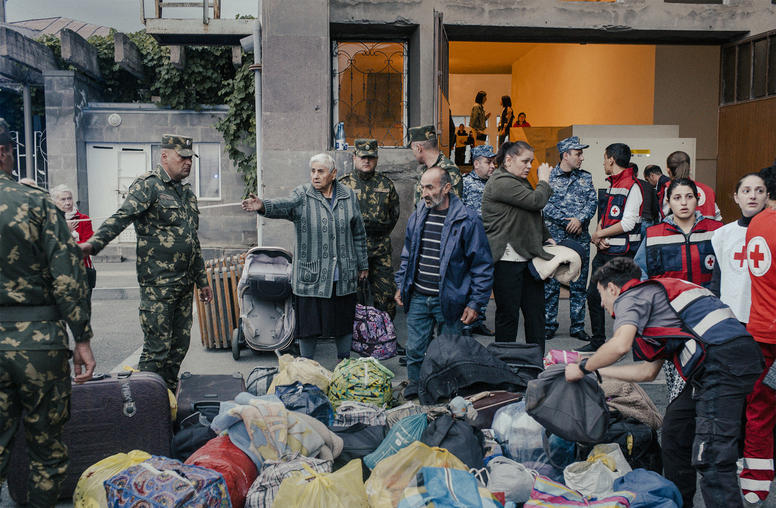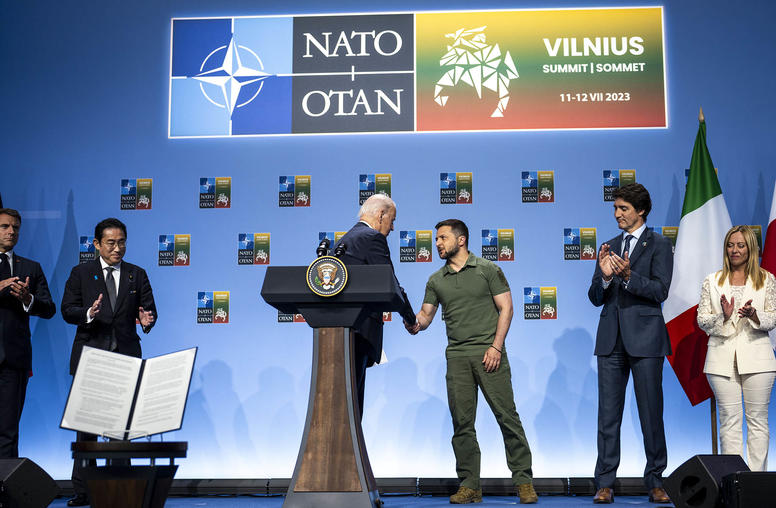Ex-Ambassador: Alter Policy Toward Authoritarian Turkey
U.S. Should Get ‘Transactional’ With President Erdoğan, Eric Edelman Says
Turkish President Recep Tayyip Erdoğan this month takes up new executive powers, making him only more central to U.S. interests in neighboring Syria, Iraq and Iran. Yet Erdoğan’s nationalism-tinged re-election last week will complicate relations, according to former U.S. ambassador to Turkey Eric Edelman. Washington should stop treating Turkey as an ally and negotiate relations “on a transactional basis” across a string of difficult issues, said Edelman who co-leads a bipartisan policy project on the region. Edelman urged Washington to pursue a more honest dialogue, ending a recent pattern of “papering over differences rather than frankly addressing them.”

Turkey’s Authoritarianism and Division
Erdoğan’s June 24 re-election, like the 2017 referendum that has let him claim enlarged presidential powers, is tainted by unfair electoral practices and voting fraud noted by election monitors from the Organization for Security and Cooperation in Europe (OSCE), Edelman said in an interview. The elections “are part of an ongoing trend of increasing authoritarianism” and “raise the prospect that Turkey is, in fact, in transition from democracy to some form of autocracy,” Edelman said.
Even as Erdoğan’s allies control all news media and permitted little or no coverage of his opponents, Erdoğan “nonetheless only got 52.5 percent of the vote in a manifestly unfair and unfree election. And so what that tells you, I think, is that, although he is a would-be authoritarian, he’s over a deeply, deeply divided country,” Edelman said.
Wanted: Bipartisan U.S. Policy
Edelman, a member of USIP’S Board of Directors, served as U.S. ambassador to Turkey, and as undersecretary of defense for policy, under President George W. Bush. He began his Foreign Service career during the Reagan administration, serving as special assistant to Secretary of State George Shultz. Edelman co-chairs a bipartisan task force on U.S. Middle East policies at the Washington-based Bipartisan Policy Center.
With his co-chair on that project, former Obama administration national security staffer Jake Sullivan, Edelman has warned Congress and the Trump administration of the risks of any fuzziness in the U.S. approach to Erdoğan’s government. Edelman and Sullivan urge a clearer U.S. policy, especially to prevent any possible clash of U.S. and Turkish forces in Syria.
Under a mandate from Congress, USIP also has convened a bipartisan task force to strengthen U.S. policies regionwide to prevent terrorist threats from “fragile” states, notably including Turkey’s neighbors, Syria and Iraq.
Likely Points of Conflict
As Erdoğan takes up his new powers, he and the United States face “a fairly daunting agenda of bilateral issues,” Edelman said. Managing the conflicts will be complicated by the Turkish election, in which “Erdoğan made recourse to an increasingly nationalist discourse,” Edelman noted. Erdoğan also will rely for a parliament majority on a nationalist party as his coalition partner. “I don’t think that [Erdoğan’s sharpened nationalism] is going to go away,” Edelman said. “He’s going to need to do that for domestic political reasons. So I think the prospects for U.S.-Turkish relations are extremely difficult. And I don’t think we should anticipate that it’s going to get any easier.”
Edelman cited several immediate policy problems with Turkey:
- Turkey has detained U.S. citizens and Turkish employees of the State Department on “trumped-up charges of collaboration with terrorism,” Edelman said. These include Andrew Brunson, a North Carolina Presbyterian minister whom Turkey has charged with spying and support for armed terrorists. Turkey effectively has used such detainees as effective hostages to squeeze concessions from the U.S. and European governments, Edelman and human rights groups have said. Two years of “arbitrary arrest and detention under the state of emergency” imposed by Erdoğan in 2016 has swept up “tens of thousands” of Turkish citizens, according to the State Department’s human rights report.
- Turkey has purchased a Russian air defense system, “which is not NATO-compatible” and has raised resistance in Congress to the planned U.S. delivery of its latest-generation warplane, the F-35, Edelman said. Turkey reportedly has planned eventually to buy 100 of the planes.
- Turkish and U.S. forces in northern Syria risk confrontation over the Syrian “YPG Kurdish militia, … with which the U.S. has been closely aligned.” Turkey describes the YPG as a virtual extension of Turkey’s Kurdish movement, with which Turkey has fought for decades. Turkey has threatened to attack the Syrian town of Manbij, where U.S. forces working with the YPG are based.
- The U.S. and Turkey face further conflict over Turkey’s neighbor, Iran, as the administration threatens sanctions against companies, including those in Turkey, that do business in Iran.
Paradigm Change?
In the interview, Edelman effectively urged the United States to change the paradigm of its relations with Turkey. He said:
“It’s easier to say what we should stop doing than what we should do. What we should stop doing is what we have been doing for the last three presidential administrations, going back to the one I served, Bush ‘43.’ We have operated on the principle that, notwithstanding all the difficulties and the frictions of the relationship, and the occasional obnoxiousness with which the AK Party government has handled its relationship with the U.S., that we should continue to treat them like an ally. And that if we continue to treat them like an ally, they’ll behave like an ally. That clearly hasn’t worked. And that clearly puts us in the position of Einstein’s definition of insanity, which is doing the same thing over and over again and expecting a different result.
“And so, I think we have to take all these issues that I just mentioned and treat them all, not as part of a broader relationship, but all as individual issues that must be dealt with on a transactional basis. And so if we’re going to make good on the F-35 transfer, then we need to get some concessions from the Turks on some other issue that matters to us. If we’re going to work with them on how we deal with the Syrian city of Manbij and removing the YPG presence from Manbij, which seems to be a major issue for the Turks, … what do we get from them on that? For each concession we make, we’re going to have to get one from them. That’s not the way that I’d prefer to work with an ally, but the government of Turkey has established that that’s the only way that we can work with them, and it’s the way that the Germans and the Russians and others have actually made work with Turkey.”
Edelman: Interview Excerpts
Points by Edelman in the June 28 interview include these:
The U.S. and Turkey need a more honest dialogue. “The reason I called for a ‘frank’ dialogue is because there has been no shortage of U.S.-Turkish diplomatic interactions since the revolution in Syria began. And that was under Secretaries Clinton and Kerry and Tillerson. But my sense has been that in many ways, the two sides have been completely talking past one another and have been papering over differences rather than frankly addressing them. … What one would hope for would be a very frank discussion in which the Turks could air their legitimate and understandable security concerns with regard to Syria. And I think, I don’t want to put all of the blame for the deterioration in the relationship on the shoulders of the Turks. I think there’s plenty of blame on the U.S. side as well. I think the Turks have got legitimate security interests and from their point of view, we have paid very little attention to that.”
Recent U.S.-Turkish talks may be progressing on Syria. “Well, look there has been the so-called Manbij working group, and under Secretary Pompeo’s leadership, and after his discussions with his Turkish counterpart, Mevlut Çavusoglu, there does seem to be some progress on Manbij, but you know it’s troubling that you can continue to see very differing statements from the Turkish government and Centcom about how this is going to all work.”
Erdoğan’s rule continues to weaken Turkish democracy. “The results of the election, for people who follow Turkey and care about the future of the country … raise the prospect that Turkey is, in fact, in transition from democracy to some form of autocracy. … Turkish elections, traditionally, have been free but not always fair. … You didn’t always have a completely level playing field, but the vote count was always more or less accurate as a reflection of the people’s will. Starting a few years ago, that was called into question. …
Last year, you had a very important referendum on the constitutional changes that created the executive presidency which only now will kick in, in Turkey. And that was a very close-run thing—it was about 51 percent—and … [the] OSCE monitors’ report from that referendum a year ago, plus investigation by social scientists subsequently, make it pretty clear that a significant amount of irregularity attended that vote. … Although there’s a debate among scholars about whether there were enough votes stolen to change the outcome, in a vote that’s that close, the referendum was clearly tainted. … After the referendum, … the laws were changed to actually allow votes that haven’t been sealed with the official seal to be counted. And there were a series other changes to the electoral laws that also made ballot box stuffing and vote rigging easier to do.”
U.S. policy cannot ignore Turkish politics. “There’s been a disposition in the Bush, Obama and Trump administrations to say, look, Turkish domestic politics is not our business, we should just focus on the bilateral relationship, and I think what we have failed to appreciate is the degree to which Erdoğan’s stance on foreign policy issues, and particularly the U.S.-Turkish bilateral relationship, is completely a function of the domestic political agenda.”
Turkey remains deeply divided. “Notwithstanding all of that [electoral manipulation] that was essentially favorable to Erdoğan, he nonetheless only got 52.5 percent of the vote in a manifestly unfair and unfree election. And so what that tells you, I think, is that, although he is a would-be authoritarian, he’s over a deeply, deeply divided country. And the nature and the challenge that faces Turkish democracy, with Erdoğan’s incredibly majoritarian view of democracy, which is ‘I got 51 percent, ergo I can do whatever I want,’ he’s got to govern a very divided country. And given his personality, and given his declared objectives, and the new incredibly powerful tools he has at his disposal as the head of a new presidential system, … I think that the democratic institutions are going to atrophy and Turkey is going to become even more of an example of a broader trend that we see, of what political scientists call electoral authoritarianism. Which is to say, a system that has the trappings of free elections … but not the substance of democracy.”


